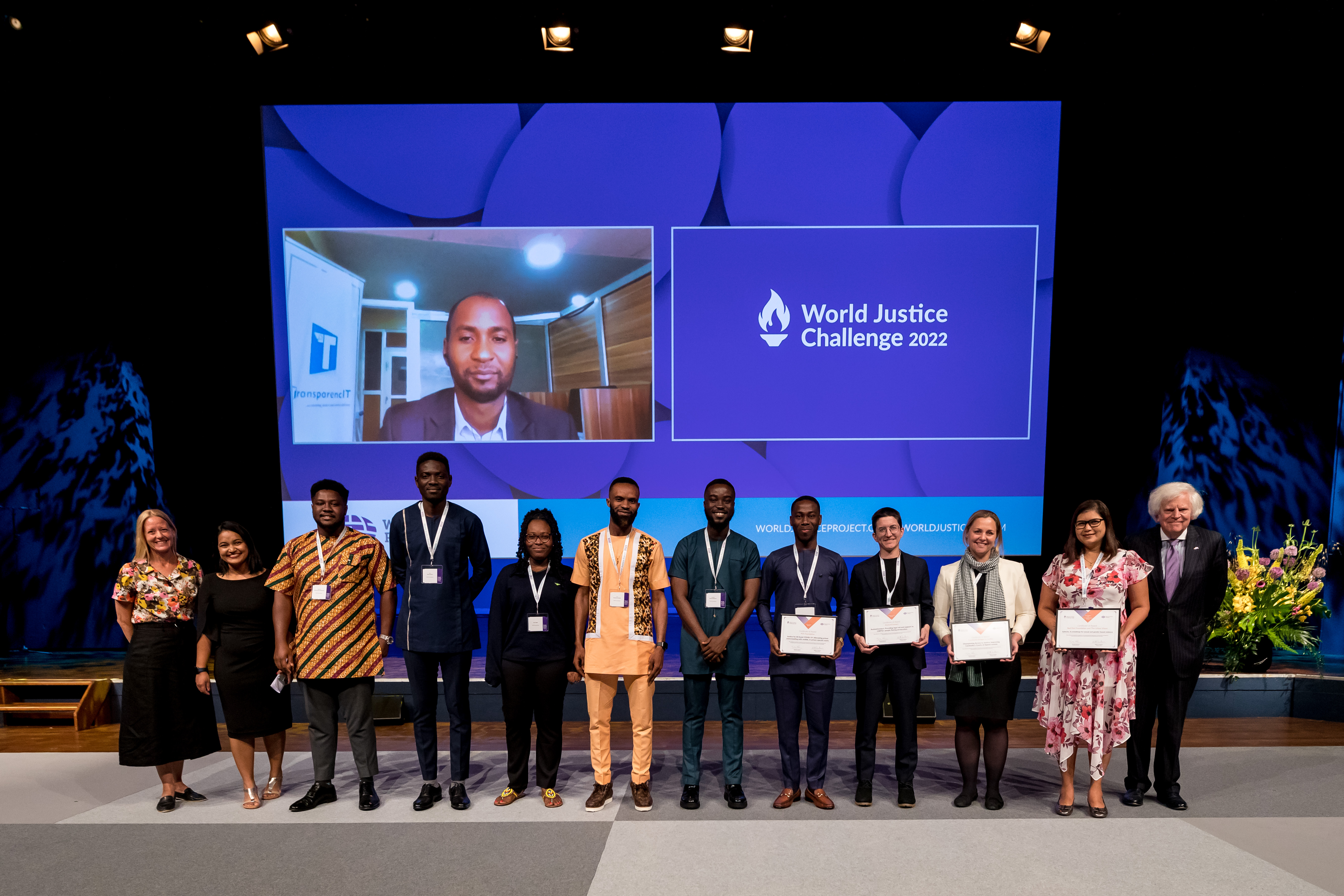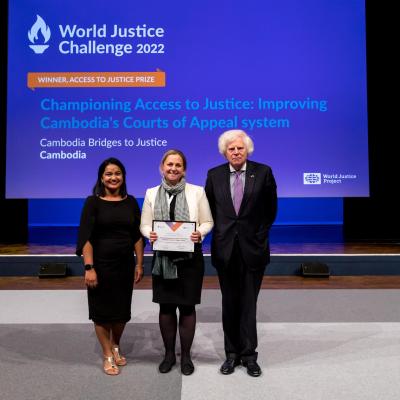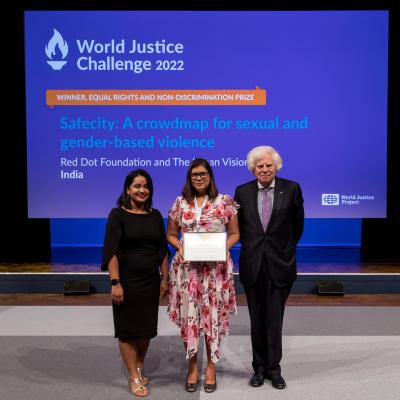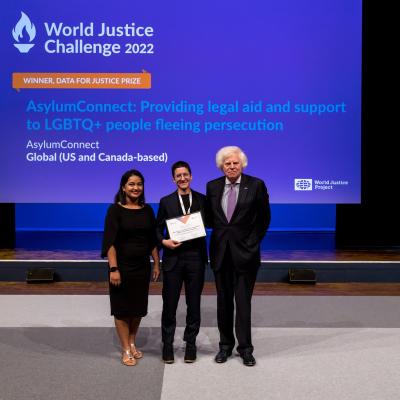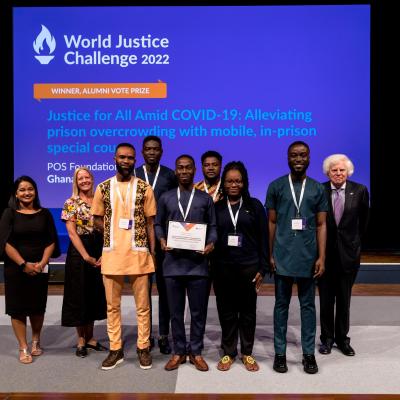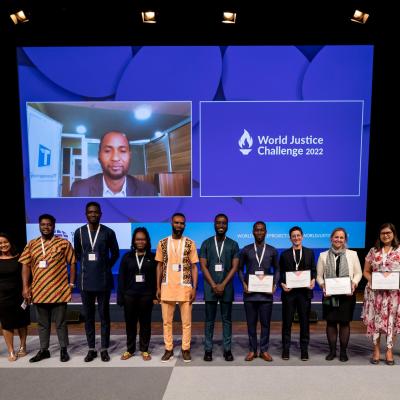
WORLD JUSTICE CHALLENGE WINNERS ANNOUNCED IN THE HAGUE
-
Five innovative initiatives from Nigeria, India, Cambodia, Ghana and a US-based global project were awarded the World Justice Challenge Prize, presented at the World Justice Forum held in The Hague, Netherlands.
-
Winning projects address structural inequities and governance weaknesses in access to justice, anti-corruption and government, and equal rights and non-discrimination.
-
A cash award of $100,000 USD will be split between the awardees.
The Hague (June 3, 2022) – At Thursday's closing session of the World Justice Forum, a global gathering of the justice and rule of law movement, the World Justice Project announced the five winners of the 2022 World Justice Challenge.
The World Justice Challenge is a global competition to identify, recognize and promote good practice and high-impact projects and policies that protect and advance the rule of law. The winning projects in India, Nigeria, Ghana, Cambodia and a US-based global project, were selected for their impact expanding access to justice, championing equal rights and advancing open government and anti-corruption measures – all while demonstrating strong prospects for replication and expansion.
"Rule of law is under attack around the world, and people are suffering countless injustices as a result," said Bill Neukom, co-founder and CEO of the World Justice Project.
"The World Justice Challenge demonstrates how communities are resisting these attacks, and how their innovations can succeed in delivering justice, opportunity, and peace. We applaud these rule of law champions and look forward to the additional impact they inspire through their exemplary work."
Selected from a pool of 305 applicants from 118 countries, the winners were among 30 World Justice Challenge finalists invited to showcase their groundbreaking work at the World Justice Forum. Finalists were evaluated by a 10-member judging panel, which included former president of Costa Rica, Laura Chinchilla, General Secretary of International Trade Union, Sharan Burrow, and human rights activist Hina Jinali.
$20,000 USD prizes were given to best-in-class initiatives under the themes of Access to Justice, Anti-Corruption and Open Government, and Equal Rights and Non-Discrimination. A fourth, Data for Justice, prize was given to the project that demonstrated the best overall use of data and evidence, and the fifth, Alumni Vote, prize was chosen by winners and finalists of Challenge competitions from past years.
The World Justice Challenge 2022 winners are:
Access to Justice Prize: Cambodia Bridges to Justice (Cambodia)
Championing Access to Justice: Improving Cambodia's Courts of Appeals system
Less than 30 years ago, there were fewer than 10 lawyers in Cambodia and only one Appeals Court in the entire country. Cambodia Bridges to Justice provides legal aid representation in 60 priority cases in two of Cambodia’s appellate courts. Since 2012, they have helped 513 people appeal their cases, with 11% being acquitted and 85% receiving more proportional sentences.
Anti-Corruption and Open Government Prize: Transparency Information Technology Initiative - TransparencIT (Nigeria)
Trial Monitoring of Corruption Cases: Creating monitoring systems, an online corruption case database, and special anti-corruption courts.
Corruption is Nigeria’s greatest obstacle to economic development; it also often goes unpunished due to slow dispensation of justice and corruption within the justice system. TranparencIT’s Trial Monitoring of Corruption Cases project has helped reduce the average duration of corruption trials from 8 years to 3-4 years, successfully advocating for special anti-corruption courts that are even speedier.
Equal Rights and Non-Discrimination Prize: Red Dot Foundation and The Urban Vision (India)
Safecity: A crowdmap for sexual and gender-based violence.
Launched in response to the 2012 gang rape of Jyoti Singh on a bus in Delhi, India, SafeCity captures anonymous data about community sexual assault incidents. The platform differentiates the type of incidents/assaults, time, date, and location. Red Dot Foundation plans to connect to other local community-based organizations that could implement SafeCity, with a goal of reaching 500,000 reports in 15 countries.
Data for Justice Prize: In Reach (Global)
In Reach: providing legal aid and support to LGBTQ+ people fleeing persecution.
Formerly known as AsylumConnect, InReach is the first web and mobile platform designed to protect LGBTQ+ people, InReach supports those fleeing persecution by matching asylum seekers, refugees and undocumented immigrants with verified legal, medical, mental health, and social service providers in the US, Mexico and Canada.
Alumni Vote Prize: POS Foundation (Ghana)
Justice for All Amid (JFAP) COVID-19: alleviating prison overcrowding with mobile, in-prison special courts.
Their work addresses several challenges in Ghana’s criminal justice system: inaccessibility of fair trials, inadequate legal education and representation, and legislative loopholes. By creating mobile, in-prison special courts to adjudicate prisoner cases throughout the country, JFAP has helped reduce Ghana's pre-trial prison population from 33% in 2007 to 12% in January 2022.
Also on the final day of mainstage events, the World Justice Project released the World Justice Forum final statement, which drew on the impact of the week’s events.
It said in part: “We are inspired by what we learned this week about the hundreds of concrete projects and proposals underway that tackle these common challenges, starting with the award-winning work we recognized as part of this year’s World Justice Challenge and WJP Rule of Law Award.
We are encouraged by growing momentum at the grassroots and policy-making levels to carry out change.”
See the full statement.


